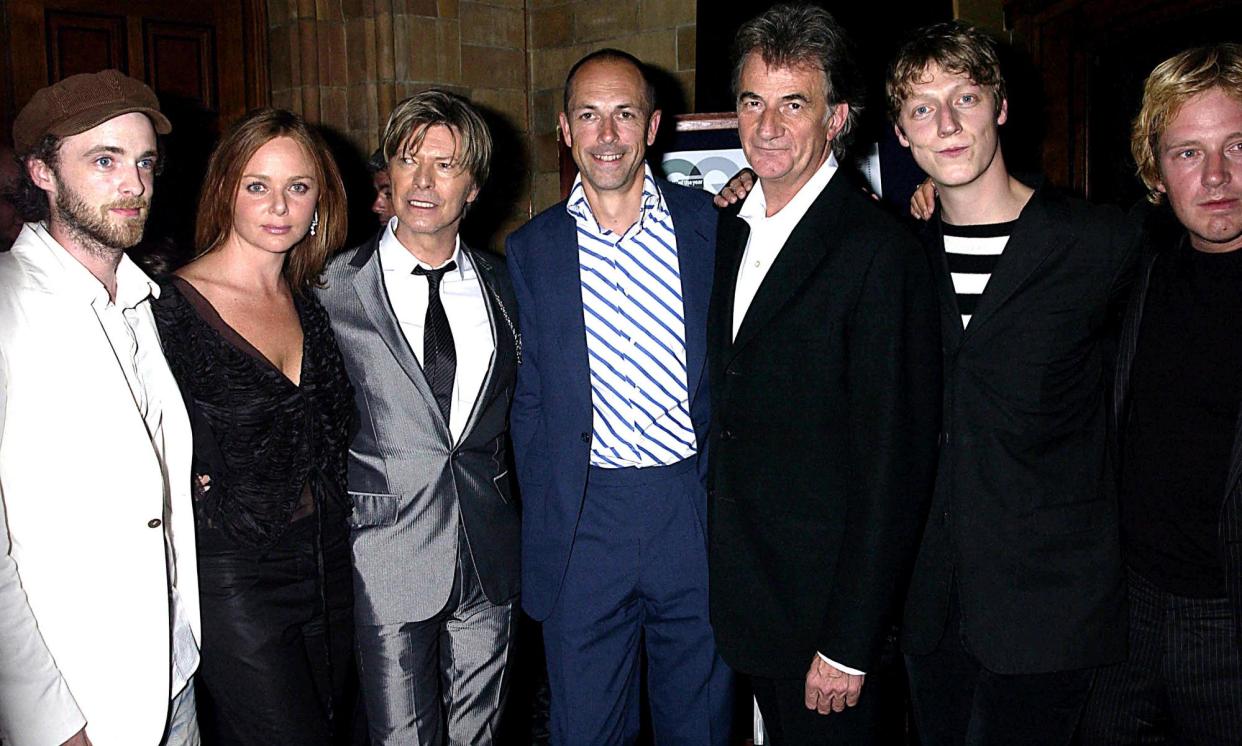These Foolish Things: A Memoir by Dylan Jones review – stars in his eyes

The efflorescence of men’s magazines in the UK lasted from about 1985 to 2010. You may recall their titles on newsagents’ shelves – Arena, GQ, Maxim, Esquire – near in time but now as defunct as the clay tablets of Babylon. They are gone, mostly, along with those newsagents’ shelves. It was a short-lived, almost parenthetical age. To revisit it in this new memoir by Dylan Jones, former editor of GQ, is to be transported to a world of scarcely imaginable glamour, of expense-account carelessness, of sybaritic indulgence unrivalled since the days of Rome. You can barely make it out through the rain of rose petals.
And squarely at the centre is Jones, scene-maker, master of the revels, and friend to the stars. Quite an irony today to read of his editorial perfectionism, and his insistence that every issue of his magazine should be an “art object”. This from the man who has just helped oversee the death warrant for the print edition of the 200-year-old London Evening Standard, having admitted to never reading a paper version of it himself. I wonder if it was not sufficiently “iconic” for him.
His was not a happy upbringing. Beaten and sworn at daily by his brutish RAF veteran father, Jones developed a stammer and a longing to get away from the family home in High Wycombe. St Martin’s School of Art in London was his refuge, where a lifelong passion for design was born. After college he worked as a barman, a model, a DJ and a film extra before finding his métier in the inky environs of style journalism. As his teenage years had been guided by the lodestars of Bowie and the Beatles, in the 1980s he succumbed to the spell of fashion and London nightlife, or as Jones calls it, “a vortex of entrepreneurial hedonism” swirling around the 100 Club, the Marquee, Soho Brasserie and the Groucho. Bliss was it in that dawn to be alive, but to be on the club guest list was very heaven.
This is a narrative leprous with names – of bands, celebrities, writers, movers, shakers – and yet wholly unilluminating about any of them
These Foolish Things makes for an interesting case study, though interesting in ways its author probably didn’t intend. The parental abuse he deals with so briskly and unselfpityingly finds an outlet in a profound insecurity that imprints itself on every page. It becomes a precarious balancing act between self-concealment and a needy, low-level boastfulness. Because Jones isn’t a great writer (he admits as much) he tends to grout the gaps in his account with lists of the great and good with whom he has hobnobbed. It is a narrative leprous with names – of bands, celebrities, writers, movers, shakers – and yet wholly unilluminating about any of them. He could be talking about brands of marmalade, or loo rolls. Even when he zooms in on one of his famous friends, such as Bowie or Bryan Ferry, we get no indication of a noticing eye or sympathetic mirroring. At times he seems faintly inhuman. “I wasn’t overburdened with empathy,” he writes, remembering how as a child he received news of human-loss catastrophes quite equably. Why? “Because there would be fewer people in the world.” Smiley-face emojis all round!
In the meantime the years roll on and Jones hops from magazines to newspapers and back, vaunting his latest pay rise, freebie holiday or celebrity catch. He calls these VIPs “boldface names”, and while he doesn’t seem to like many of them he arranges their private jets and financial sweeteners without demur. Name-dropping, a pathology for him, needn’t be fatal in itself. In this kind of memoir it doesn’t necessarily matter if the prose doesn’t shine so long as you convey a sense of energy, or fun, or charm (this last the most elusive of the three). I’m thinking here of Robert Evans’s The Kid Stays in the Picture, which positively ached with self-aggrandisement and yet jollied the reader along with its chutzpah and its delight in the folly of the world. Jones already has his work cut out for him in dallying with people – Piers Morgan, Philip Green, David Cameron (with whom he wrote a book) – that very few writers could humanise, and even the famous people you’d quite like to know about end up flattened by his affectlessness. And worse. He doesn’t seem to hear himself when he illustrates how “extraordinarily funny” Elton John can be with a version of a remark of such repulsive misogyny in my view that I’m surprised his editor (if he had one) didn’t advise him to cut it
Towards the end the book springs a shock revelation, which may partially explain why Jones ended up the way he did. It happened when he was 17, still in High Wycombe, and someone he “sort of knew” drove him back to his flat and got him drunk. He woke some hours later to find himself being raped. He describes feelings of self-hatred and disgust that followed in the wake of the assault, and how he then opted to do something perfectly comprehensible – namely, bury it. The trauma of what happened crashed in on him years later when he did therapy. The reader may find himself in hindsight recalibrating his view of the author’s arrogant dismissiveness, his absence of charm, his tin ear for the vile joke or tasteless remark. Humanity’s crooked timber and all that. Tout comprendre, c’est tout pardonner. Whether you can pardon him this book is another matter.
These Foolish Things by Dylan Jones is published by Constable (£25). To support the Guardian and Observer order your copy at guardianbookshop.com. Delivery charges may apply


